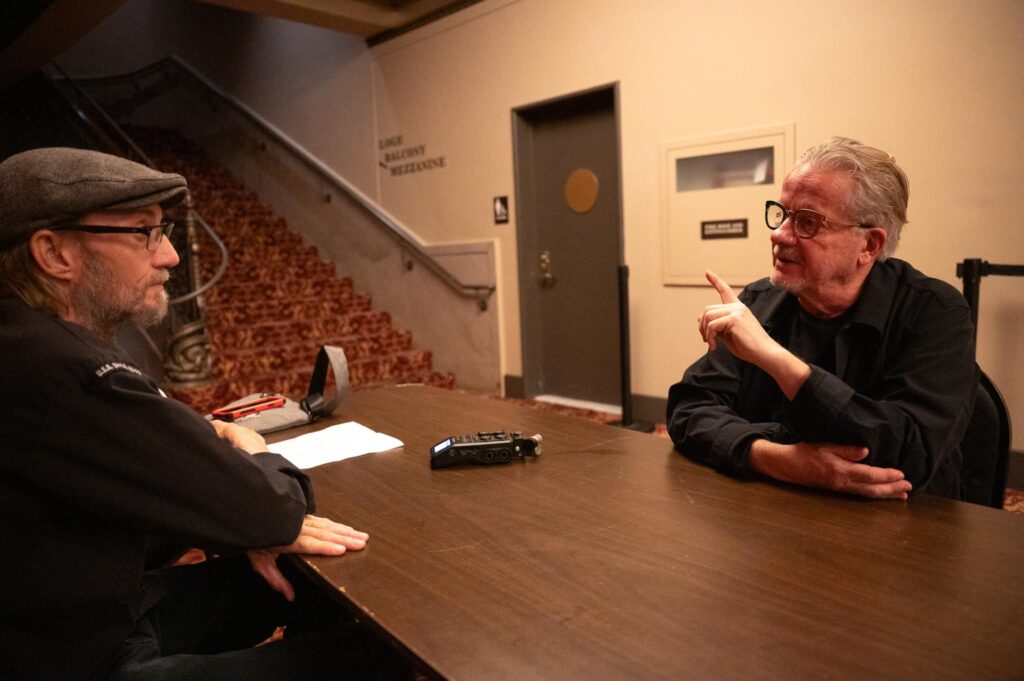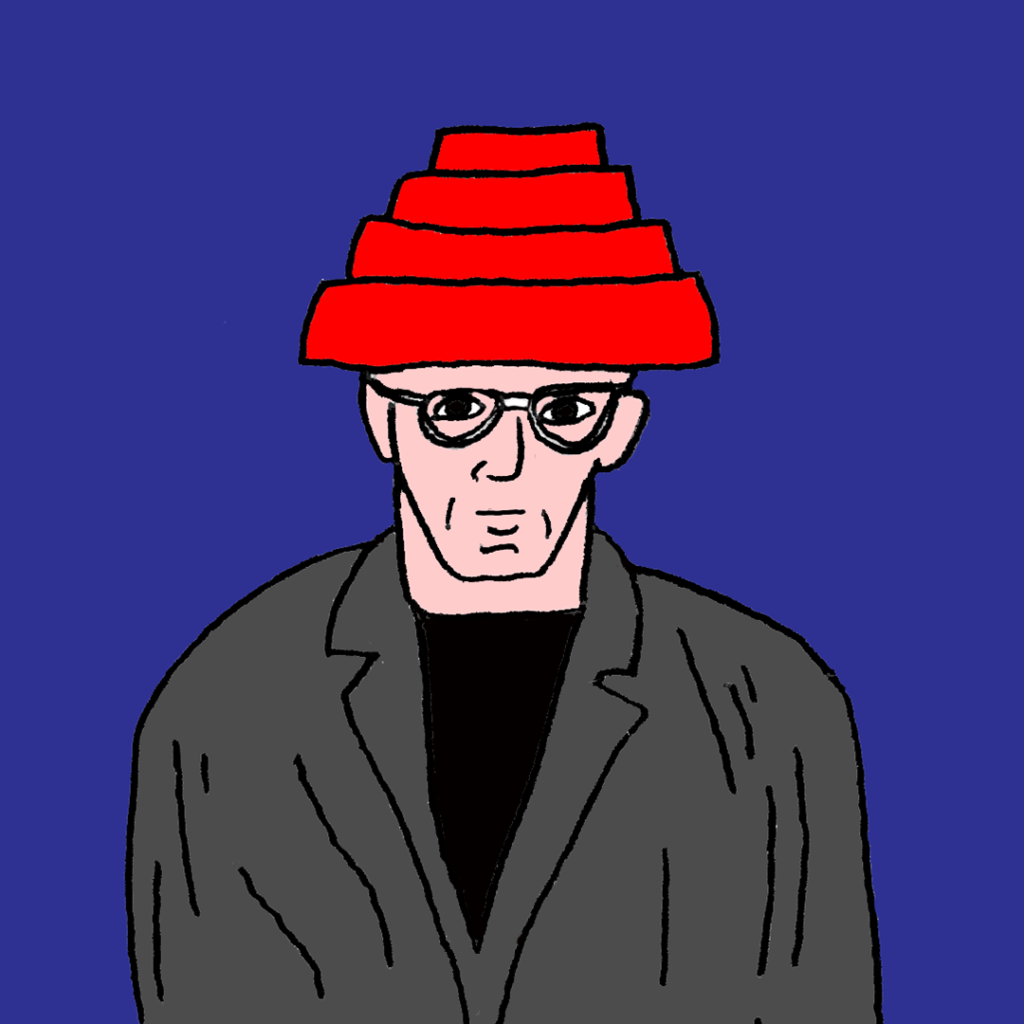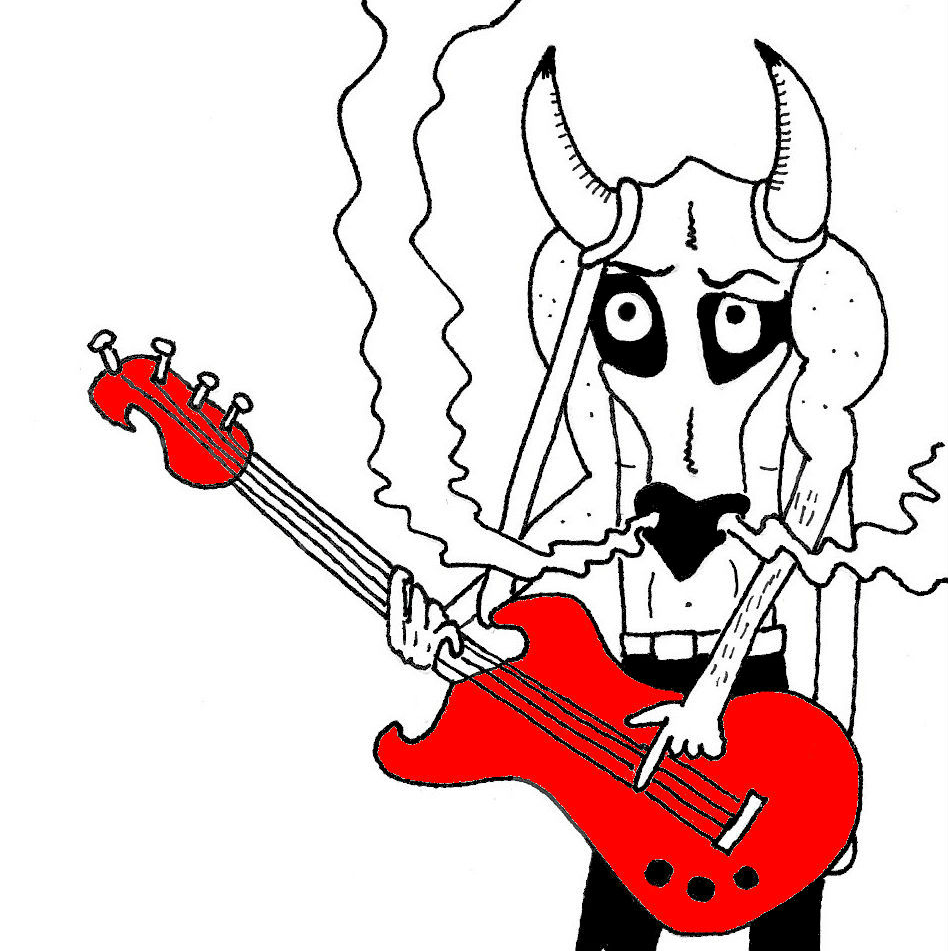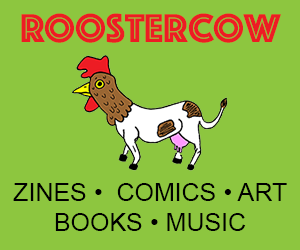
Mark Mothersbaugh Interview by David Gill
DEVO’s 50th-anniversary tour roared into San Francisco last November, and I got the opportunity to sit down with Mark Mothersbaugh. After an instant COVID test, I was whisked backstage with my photographer and we met Mark.
We sat at a folding card table in the lobby of the San Francisco Theatre as Mothersbaugh riffed on his influences, from the massacre at Kent State to old sci-fi films for almost an hour. While some of the interview was excerpted for an article at RIFF Magazine the rest is presented here for your enjoyment and elucidation.
UPDATE: On January 24, 2024, Mark announced the publication of his origin of the book APOTROPAIC BEATNIK GRAFFITI. The awe-inspiring visual odyssey showcases a compilation of neo-dada stream-of-consciousness visual poetry, capturing one individual’s reflections on life on a dynamic planet.
The origin of the book can be traced back to Motherbaugh’s encounter with ‘mail art’ in 1969 when initiated a collection of his own artwork in red archival books, amassing nearly 700 in his collection. ABG showcases five of these books created in the past decade, serving as inspiration for lyrics and concepts in larger art projects.
REGLAR WIGLAR: Devo has always had a unique relationship to tradition, what happens when Devo becomes tradition?
MARK MOTHERSBAUGH: We become the New Traditionalists. We like the idea of setting new tradition. I think the new traditions that Devo, I mean, you know, it’s like, this is like a 50th-anniversary tour if you want to call it something.
RW: Can you talk about the role of the Kent State shootings in the formation of the band?
MARK MOTHERSBAUGH: I think it played an important part. We were there for that.
RW: You were there that day?
MARK MOTHERSBAUGH: I was there the first day when we marched on the recruiting station and then kids behind me were throwing rocks and breaking the windows. I wasn’t like a peacenik, but I was not a tear-the-place-down kind of guy. So I was bummed out by it.
Then the next day my brother, Bob — he was a high school kid — he hitchhiked from 30 miles away because he wasn’t old enough to drive yet. He showed up for the night that they burned the ROTC building down. And that’s what got the governor pissed.
The next day there was a May 4th thing where all the National Guardsmen showed up with guns and Jerry was around for that one. So yeah, we were there for that whole thing.
I kind of was at odds with everybody in my school from kindergarten through 12th grade for whatever reason. I was just the little guy that had to fight with everybody. I remember in second grade there was a little girl who said to me, “Why is your head shaped like a light bulb?” I ran to the restrooms so I could look and was like, “Oh my God, my head IS shaped like a light bulb.
RW: Did the violence at Kent State change your attitude toward making music or making art?
MARK MOTHERSBAUGH: Well, what changed is, before that, I remember we’d be at meetings — maybe the Yippies or Students for a Democratic Society — and they’d say, Why are we in Vietnam? There’s no good reason for the US to be over there. And I was thinking, yeah, I can’t think of one Vietnamese person I would want to kill. Why are we over there killing Vietnamese people? I don’t like that at all.
So we were protesting and I felt like we were doing something and the people were paying attention to us. We felt like we were doing the right thing.
We were just thinking that while we were writing music. And music was changing too. Before that, there was Country Joe and the Fish and “One, two, three, what are we fighting for.” There was a lot of political music out there and there was Bob Dylan and Joan Baez. There were a lot of people that were politically conscious. All that all disappeared.
After the trouble on campuses all over the country that summer, the music turned into two styles. It turned into concert rock with like Foghat, Styxx, White Snake, stuff like that. It was all like “I’m white, I’m a misogynist, I’m a conspicuous consumer and I’m proud of it.”
There was that contingency and then the other contingency was disco. To us, disco had great sounds, but it was always moronic, you know. It was like (singing) “I was born, born, born, born, to be alive.” We’re like, that’s the stupidest lyrics I ever heard. We always thought of disco as like a beautiful girl with no brain and so we thought we want to do something else.
We want to talk about things and we want to talk about our opinion of humans and how they relate to planet Earth. We’re thinking, if rebellion doesn’t work, how do you change things in this country? Who does change things? And we looked around.

I remember one day I was painting an apartment in Akron for a day job, painting the ceiling and the radio’s on and this music comes on and it’s “Pachelbel’s Canon.” It’s a beautiful song, you know (singing) “La da da da da da da da da”. And then lyrics came in and they went, “Hold the pickles, hold the lettuce, special orders don’t upset us, all we ask is that you let us serve it your way.” And I’m like, holy shit, they’re selling Burger King.
Within a month or so there was some article in the paper about how Burger King used to be down here and McDonald’s up here and Burger King shot up and was nipping on the heels of McDonald’s. They did that piece of music arranged in a country western version and they did a jazzy version and they did a Singing Nun version because the Singing Nun had a hit at that time. So we thought, that’s it! It’s a version. So that’s how we ended up out in Hollywood.
RW: Your music, your art. It functions like science fiction. It’s in that it’s a critique of the now. But it’s like based on exaggeration, it’s based on extrapolation, based on kind of a literalization of the thing you’re doing. Was that a big influence? Did you, were you a sci-fi kid?
I was legally blind when I was born. So I walked to school for two years not knowing that I couldn’t see where I was going or what my school looked like. I got reprimanded for making smart-ass comics, comments about things on the board, and stuff like that. I was like, how do kids know the right answer? So I just, from first grade, I just started off on the wrong foot but I got glasses and then I could see things and it was another world. But they were these super thick classes. So, you know how it is.
MARK MOTHERSBAUGH: Yeah, we loved all that stuff. I mean, we loved Italian sci-fi movies and Japanese too — Godzilla and all those characters where you could see the zipper on the guys (monster suits). That just made it better. That didn’t make it worse. But the story with the Japanese films, they were always freaked out about the atomic bomb. That was the basis for all their sci-fi movies. That was amazing.
RW: But how does that trickle to Akron, Ohio in the 1960s?
MARK MOTHERSBAUGH: Well, you see it on TV. You see it. It’s like, you know, films really influenced us a lot. The song, “Jocko Homo,” which I guess you could call Devo’s theme song, I wrote that song after — I had a pamphlet that a school teacher had given me that he had found, because he knew we were doing a band based on de-evolution. He found this one called “Jocko Homo.” You opened it up and there’s a devil and it says, de-evolution on his cheek. And it’s from 1933. So it’s like, it was like reactionary to Darwin’s, theory of evolution.
So I was watching movies and there was this one movie called Inherit the Wind, about the Scopes trial. There’s a scene in it where the town has gone from being totally asleep to now some of the people are renting out rooms to the people that are coming in to see the trial. They’re setting up cotton candy stands and stuff like that. And then one guy, he’s got a chimp sitting on a table and he goes, “Is this your relative?” And behind him, it said ‘de-evolution man.’ And at one point there’s a close-up on the ape. On one side it says ‘DEVO’ behind him and it pans across and it says ‘Man.’ So it says ‘DEVO Man’ and I saw that in the film.
Then there was a film called Island of Lost Souls in the ‘30s with Bela Lugosi. It’s got a mad scientist— like in our “Jocko Homo” video — in a white lab coat and there’s like these characters that are animals that he would operate on and try to evolve them, but it would always fail.
He was in the House of Pain and they were all frightened to death because all they heard was screaming and horrible noises as they were getting evolved. Bela Lugosi looked like a wolf-man kind of character. But whenever the animals would get upset, the professor would jump on top of a rock and he’d crack a whip and say, (in dramatic voice) “What is the law?” And they would all snap to attention and go “Not to walk on all fours. Are we not men?” Then he’d crack the whip and go, “What is the law?” And they’d go, “Not to spill blood. Are we not men?”
At one point they find out that he actually isn’t invincible, that he’s not a god and they decide to take their revenge out on him and take him to the House of Pain. At one point, Bela Lugosi goes, “We’re not human, we are not beasts, we are things.” Then you see them, the shadows of them running because of the flames in the compound, you see their shadows all hunched over and running along the side of the House of Pain while you hear the doctor screaming inside. And I was like, that looks like Akron at five o’clock. That looks like everybody getting off work at Good Year. I go, I live in the House of Pain! So, movies had a lot to do with early DEVO.
RW: Do you think you were visually oriented because of your eyesight as a kid?
MARK MOTHERSBAUGH: Oh, I know it. When I was seven, I got a pair of glasses — I never saw the sun before. I never saw a cloud. I had never seen telephone wires. I’d never seen the roof of a house. And I walked out of this (eyeglass) place and now everything was in a orb — a fish eye lens view — anything that came close would get giant and then it would get tiny when it went away. But it was in focus for the first time in my life. I’d never seen anything in focus that wasn’t this close. I saw my school for the first time because of where the doctor’s office was and I saw the woods I used to walk through every day blind and still make it to school.
I remember that night because I had seen trees for the first time. And I was drawing trees the next day. My teacher who had spanked me and sent me to the principal’s office and stood me in the corner with a dunce cap — It was the ‘50s, you understand, they did that stuff. She said, You draw trees better than me. I went home that night and I dreamt I was going be an artist. From the time I was 13, I knew I was going to be a visual artist.
RW: What do you think of AI?
MARK MOTHERSBAUGH: I think it’s intriguing. I was doing a bunch of work on it with this guy Ed Barker, he was DEVO’s first sound man. He was our sound man all the way through Freedom of Choice. I worked with him before I worked with Jerry. Ed and I were working together writing music, trying to figure out what I wanted to do… I didn’t know exactly what it was and when I met Jerry, it’s like it was like peanut butter and chocolate. We complimented each other perfectly.
But Ed, he started producing bands like Meat Puppets and those kinds of bands. He did a lot of that stuff out here. And then he started working at museums and he worked at museums for decades. About five years ago, his brother got Parkinson’s so he moved back to Ohio to take care of his twin brother. There was a lot of downtime so he got into AI at the very beginning of it.
Then we started working together and we started mutating all of this artwork of mine and then all of these images of DEVO. So even in this new release we put out there’s an image that he did. And on stage tonight, there’ll be some AI images that Ed created. We were at a point where, like about three months ago, where we were just about to start doing animation stuff and then he went and died. I couldn’t believe it. It was terrible.
RW: So what do you do now in your spare time?
MARK MOTHERSBAUGH: I’m still doing TV and film. I have a couple of films that are in the works. Everything got kicked down the road. The pandemic stretched things out. I’m working on about four different TV shows. I’m doing a few with Taika Watiti. We’ve been working together since Thor: Ragnarok. So I’m doing that stuff.
RW: What’s your favorite song, do you have any favorite song to play?
MARK MOTHERSBAUGH: It changes all the time. I really liked doing “Smart Patrol” the other day because the synth was working properly. Sometimes it acts up because it’s the synth’s from the early 70s, one of the Minimoogs. It gets temperamental.
RW: How about “Satisfaction”? How do you think that’s aged?
MARK MOTHERSBAUGH: I think people enjoy it. For us, it was really good because it was a doorway in for people that were going, What the hell are these guys doing?
RW: Mick didn’t like it?
MARK MOTHERSBAUGH: No, he did. We had to play it for him before we could put it on an album in those days. Now you don’t have to, but you did back then. So we went to his manager’s office in New York City and he came in the room and we put the record on and he sat there for a minute. Then he got up and he danced just like Mick Jagger. He liked it. I’ve heard him say he thought it was the best of all the Rolling Stone covers.
RW: When that song came out, the record company said they wanted cardboard cutouts to put in the record stores and you opted to make a video instead.
MARK MOTHERSBAUGH: Yeah, that’s true.
RW: It couldn’t have been better timing because that was in the can when MTV came on the air and they had it. What would you tell a band to do today if they were putting out a record?
MARK MOTHERSBAUGH: Do you want the negative side of what’s going on now or the positive side?
RW: I’ll take the positive side.
MARK MOTHERSBAUGH: The positive side is what I think’s interesting. There’s more power here than the Beatles had when they did their first album. You can do more things and kids all have phones. They all have access to it. When I was in my 20s I remember going I wonder what a record company is. I have no idea what a record company is. I know they press the records and I read things on like little things about trademarks and copyrights and BMI and ASCAP and stuff like that. But I don’t know what any of that means. What is all this stuff?
RW: I think it’s a great place to end.
AUTHOR BIO
David Gill writes about music for RIFF Magazine and White Crate. He teaches writing and literature at San Francisco State University and is currently at work on a full-length biography of science fiction weirdo, Philip K. Dick.
FROM THE ARCHIVES
Thank you for reading this Mark Mothersbaugh Interview. Read the Reglar Wiglar interview with David Gill.

